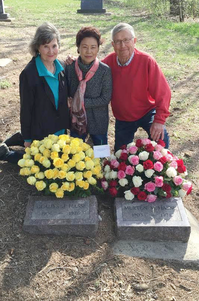For Bong Sen Kim, also known as Bessie Kim, Vermillion has a hold on her heart, and while her journey began more than 50 years ago, it will never let go.
“I came to the University of South Dakota (USD) and the community of Vermillion in 1968 as an exchange student,” she explained. “I was from a small village in Korea and I met father (Merten Hasse) when he was in Korea. He welcomed me to his home. This trip is an opportunity for me to say thank you.”
To this day she considers Hasse and his wife Gladys Hasse father and mother and their children Paul Hasse and Margret Hasse siblings.
“The day I left to move to go to Stanford in California, she moved into my room,” explained Margret. “She became part of the family. That is just the way my parents were. They welcomed several students into their home. Dad was a professor at the University and he believed in opening doors for students he met on his travels.”
Kim says she never felt unwelcome in Vermillion, even though 1968 was at the height of racial tensions around the country.
“There was a small group of us that were international students,” she explained. “But for the most part there were not very many of us. We would meet once a semester or so. But I was very welcomed. I kind of feel like I was a princess.”
Kim explained that growing up in Korea, while she was the oldest child, she was also always very gifted in terms of her education. Because she was a very good student, her Korean parents had never really made her do the house work and chores that her siblings were required to do.
“My focus was always education,” she said. “That continued when I came to America. I don’t remember them ever asking me to do any work around the house. That is why I wanted to honor them when I began my mission work. I know father always dreamed that when I graduated from college, I would go back home and help out those less fortunate than me. I waited 30 years to do it. I know I was a disappointment to him in that, but I am following his dream now.”
Following graduation, rather than returning to Korea, Kim moved to Los Angeles where as an entrepreneur she started and ran several successful businesses. After 30 years, she decided it was time to fulfill her and Hasse’s dream.
“My first mission was to help my family,” she said. “Of course I did that. All of my siblings and their children now live in the United States and have very good lives. But when I decided it was time to do missionary work and I looked around Korea, I realized that we have been very fortunate.”
Kim said that those who live in South Korea, because backed by the United States after the Korean War, are very successful.
“Our country is very wealthy,” she said. “We are considered one of the three Asian Dragons.”
Because of that she said she looked outside Korea to continue her mission work.
“I had visited the Philippines and couldn’t believe the poverty and devastation that was there,” Kim said. “They have nothing. There are people that live in cemeteries because they can’t afford to build homes. It isn’t unusual to see families using the caskets, which are above ground, as their walls and tables. But if you see them in the city, they never look poor because they wear clothes that have been donated to them.”
Her goal: to educate the children and give them a hand up so they can succeed and help improve the conditions themselves.
“We have built schools,” she explained. “We have gone in and where they were using terrible conditions, we have built a beautiful mission where they can go to school and learn.”
The mission is called the Hansori Mission Center in Cebu, Philippines.
“I am very proud of what we have accomplished and I know father would be very proud of me,” she said. “We have made it a beautiful place, a learning place, a place of education.”
Kim explained that her intention was to name the mission after the Hasses, but in the end was not able to.
“We are very small,” she said. “After I am gone, I don’t know if the mission will continue, but because I wanted it to, we have connections with our church.”
Kim is very religious and said that in Korea Christianity is the main religion; however, the more traditional Buddhism is growing in the country.
“Many of our youth are exploring Buddhism again,” she said. “I am not sure why they are turning to Buddhism, I guess it is to find their traditional roots. But they are still doing good works.”
A Journey of Thanks
While Kim and the Hasse children have stayed in contact throughout the years, she said she chose to return to Vermillion this past weekend to honor her parents with a journey of roses.
“The timing was just right,” she said. “We use roses to honor our loved ones. So, I am calling this the Journey of 200 roses.”
Near the 50th anniversary of Merten Hasse’s death, she chose to return to Vermillion and visit.
“Even though I have not lived here for a long time, this is still my home, these are still my parents,” she said. “My country’s tradition is to honor your parents and loved ones. I wanted to come and visit them and thank them.”



